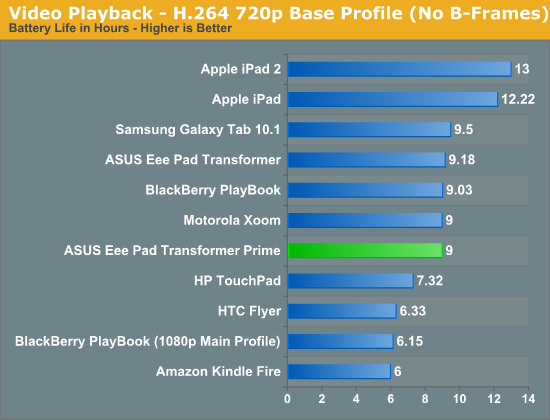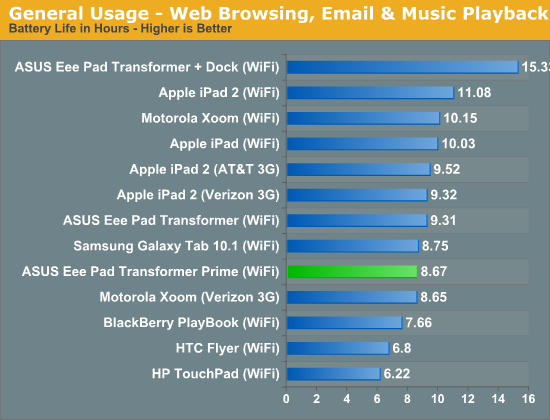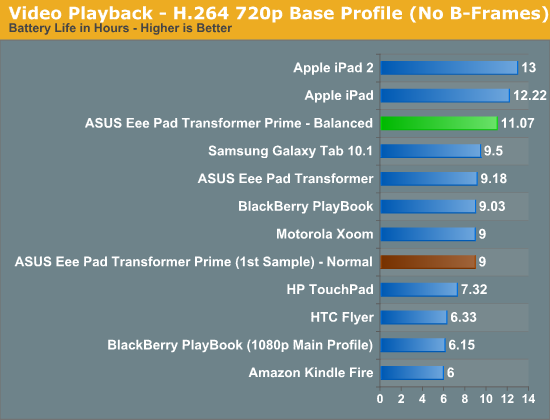ASUS Eee Pad Transformer Prime & NVIDIA Tegra 3 Review
by Anand Lal Shimpi on December 1, 2011 1:00 AM ESTBattery Life
With 39 hours to test I was pretty limited in what I could do when it came to battery life testing. I was able to run through two tests (one run a piece) and only in one configuration each. I wanted to see how Tegra 3 and the Prime fared in the worst case scenario so I picked the Normal power profile. Over the coming days I'll look at battery life in the other two profiles as well, not to mention run through more iterations of our test suite.
My bigger concern has to do with the malfunctioning WiFi in my review unit. For our video playback battery life test WiFi was on but not actively being used, those numbers should be ok. It's our general use test that loads web pages and downloads emails over WiFi and it's there that I believe things could've suffered a bit.
In both cases I saw around 9 hours of continuous battery life out of the Transformer Prime, without its dock. These numbers are a bit lower than the original Transformer but it's unclear to me how much of this is due to the additional cores/frequency or the misbehaving WiFi. The fact that we're within striking range of the original Transformer with the Prime running in Normal mode tells me that it's possible to actually exceed the Transformer's battery life with the Balanced or Power Saver profiles. That's very impressive for an SoC built on the same manufacturing process as its predecessor but with twice the CPU cores and a beefier GPU.


What I'm not seeing however is the impressive gains in battery life NVIDIA promised its companion core would deliver. I'm not saying that the companion core doesn't deliver a tangible improvement in battery life, I'm just saying that I need more time to know for sure.
That the Transformer Prime can deliver roughly the same battery life as its predecessor without any power profile tweaking may be good enough for many users. Both ASUS and NVIDIA shared their own numbers which peg the Prime's battery life in the 10 - 13 hour range. As I mentioned before, I'll have more data in the coming days.
Update - With a replacement Transformer Prime in house, battery life is looking a lot better already:

Update 2: Even more battery life results in our follow-up.










204 Comments
View All Comments
metafor - Friday, December 2, 2011 - link
1. The advantages of a companion core apply just as much to single, dual or quad core systems. In each case, individual cores can be power-gated. The companion core is there to provide lower idle power even beyond a single core. So no, going with a dual-core doesn't somehow make a companion core less necessary.2. A15 is huge compared to A9. Huge. Both in area and power. If anything, an A15 SoC needs a companion core even more than anything based on A9.
3. Because A15 is huge, a quad-core in a smartphone form factor isn't very feasible at 32nm. Nor is quad-core really all that useful for the vast majority of use-cases anyway. Especially since A15 performs so much better per-core than an A9.
phantom505 - Thursday, December 1, 2011 - link
Yeah, who can put up with a mere 9 hours of continuous playback. It's so bad....Oh wait...
medi01 - Thursday, December 1, 2011 - link
iPad 25 Wh battery.Galaxy Tab 14.8 Wh battery.
;)
thunng8 - Thursday, December 1, 2011 - link
Why are you comparing the ipad to the 7" Galaxy tab? Of course the ipad will have a bigger battery.quiksilvr - Thursday, December 1, 2011 - link
I was actually surprised too. To be fair, the A5 chip is huuuuge in the iPad, but that doesn't change the fact that it's still beating a quad core setup.My guess is ICS will optimize quad core capabilities more and we'll be seeing a very different picture once that is released.
So I say wait for ICS and then pass judgement.
vision33r - Thursday, December 1, 2011 - link
How is it a surprise? Core i5 can match up against Core i7 in 95% if apps without needing the extra cores.In real world test, the difference between Core i5 and i7 performance is hardly measurable.
name99 - Thursday, December 1, 2011 - link
Of course by the time ICS is actually available on these sorts of devices, iPad3 with A6 will probably be out...Point is: a "my vaporware can beat up your vaporware" contest is generally not very enlightening to anyone.
daveloft - Thursday, December 1, 2011 - link
It has nothing to do with the CPU, it's all about the GPU.medi01 - Thursday, December 1, 2011 - link
Yeah, iPad wins hands down and it's very practical too.Think about encoding video in a browser using javascript, for instance
metafor - Thursday, December 1, 2011 - link
I think a lot of people (including myself) go with Android because we like the additional features provided by the OS -- true multitasking, choice of a plethora of browsers, third party players, no iTunes, Google integration, etc.But yes, iPad 2 has been king of both performance and battery life for a while now.